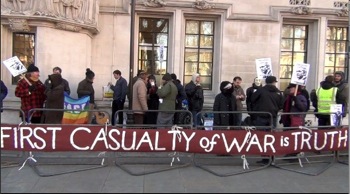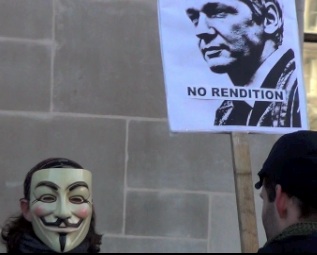 During the second and final day of the U.K. Supreme Court's hearings on Julian Assange's extradition, Matrix Chambers attorney Clare Montgomery offered her rebuttal to arguments made yesterday by Assange's counsel. (Dinah Rose is representing Assange in his fight against extradition to Sweden for questioning on sex crime allegations.)
During the second and final day of the U.K. Supreme Court's hearings on Julian Assange's extradition, Matrix Chambers attorney Clare Montgomery offered her rebuttal to arguments made yesterday by Assange's counsel. (Dinah Rose is representing Assange in his fight against extradition to Sweden for questioning on sex crime allegations.)
The week's proceedings have highlighted disparities of law among EU countries and the legal challenges involved in reconciling these conflicts. Assange's case may test the extent to which EU nations can maintain their legal autonomy under the rubric of a unified European system. It may also raise the question: to what degree will EU states have to harmonize their conflicting legal regimes in order to avoid this sort of continued legal wrangling in the future?
Montgomery presented Sweden's case against Assange for about four hours, during which time she appeared to reject EU-wide legal standardization -- essentially arguing that respecting state sovereignty requires preserving the status quo. If it agreed with Montgomery's position, the Court would have to accept significant differences among EU nations in implementing EU-wide legal standards. By contrast, Assange's legal team largely took the position that, while allowing for some variation and inconsistency, the Court should mandate certain universal principles in the extradition process, because of the seriousness of the potential risk that extradition may pose to individual rights.
 At Day 1 of the Julian Assange extradition hearing
At Day 1 of the Julian Assange extradition hearing
On the night before the hearing began, one dedicated Assange supporter in London told me that she planned to arrive at Court by 6 a.m., ahead of the throngs that she expected based on the turnout at Assange's hearing last November. No doubt the freezing February temperatures kept large crowds at home this morning; instead of the masses anticipated, there were only a few orderly lines segregated into cameramen, sign-wielding protesters, and the courtroom audience -- a mix of media representatives, Assange faithfuls, and the curious. I was in the latter line, which was also peppered with a few Occupy London luminaries. During the next hour of collective shivering, I met journalists from all over Europe and the U.S., who now braved frigid weather to witness this historic proceeding. Arriving at around 8:30, one hour before the Court opened to the public, I witnessed the expectant crowd devolve into a chorus of complaints as the early-morning, late-winter wind chill robbed our fingers of almost all feeling.
But, mercifully, 9:30 at last arrived -- as did Assange, soon after. The white-haired WikiLeaks founder offered a spirited hello to the crowd and preceded us into the Court.
At the entry, Court staff had handed out a media briefing, which included the following details:
"Issue: Whether a European Arrest Warrant ('EAW') issued by a public prosecutor is a valid Part I EAW issued by a 'judicial authority' for the purpose and within the meaning of sections 2 and 66 of the Extradition Act 2003.
Theme by Danetsoft and Danang Probo Sayekti inspired by Maksimer